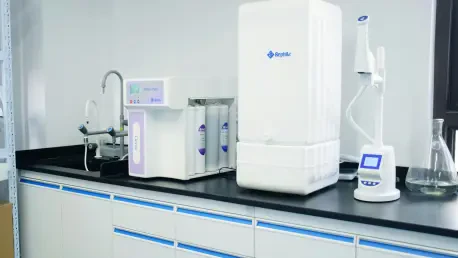As the alternative protein industry strives to capture a significant share of the global protein market by 2035, optimizing bioprocessing emerges as a critical task. In an era where innovation is driven by sustainability and efficiency, manufacturers find themselves relying heavily on pump technologies for processes like accurate dosing, efficient product transfer, and maintaining optimal pH conditions within bioreactors. Companies like Watson-Marlow Fluid Technology Solutions (WMFTS) offer invaluable expertise, unveiling how cutting-edge pump technologies can address these pressing challenges. Achieving cost reduction, ensuring quality and consistency, and embracing scalability are key toward sustainable growth in this competitive market.
Overcoming Cost Challenges in Production
Efficiencies Through Streamlined Pump Systems
Cost reduction remains a high priority in the production of alternative proteins as manufacturers seek economical solutions without compromising quality. By adopting pump technologies that are easily integrated and simple to clean, production facilities can minimize downtime and streamline operations. Simplicity in design also allows for compatibility across various systems, further reducing potential disruptions and maintenance costs. This efficiency is further enhanced by precision in dosing, a critical factor in minimizing waste and optimizing resource utilization. Pumps that ensure high dosing accuracy contribute not only to economic savings but also to sustainability efforts by adhering to stringent environmental standards.
Economic Benefits Aligned with Sustainability
The concept of sustainability in the alternative protein industry is intricately tied to economic efficiency. By selecting pumps that offer superior dosing capabilities, manufacturers can fine-tune their processes to align with both cost-saving objectives and environmental responsibilities. These pumps facilitate the maintenance of optimal bioreactor conditions, which is essential for maximizing yield and ensuring smooth production runs. This economic efficiency, supported by high-precision technology, aligns seamlessly with industry goals to reduce carbon footprints and preserve natural resources, positioning manufacturers at the forefront of responsible and sustainable protein production.
Ensuring Consistent Quality in Production
Importance of Low-Shear Pumps for Integrity
In the realm of alternative protein production, ensuring the highest quality throughout the cultivation process is paramount. A pivotal component in safeguarding protein integrity is the use of low-shear pumps, which can significantly reduce the risk of damaging sensitive cellular structures. By handling proteins with care, these pumps maintain the desired consistency and quality required for end products. Advanced pump solutions also provide in-process controls, which are vital for detecting and mitigating inconsistencies during production, thus enhancing the reliability of each batch and ensuring that product standards are consistently met.
Technological Advancements for Reliable Outcomes
With the growing demand and expectations for quality, manufacturers rely on forward-thinking technologies that blend precision with adaptability. The incorporation of sophisticated sensor technologies within pumps enables real-time monitoring, facilitating immediate adjustments to maintain process accuracy. As a result, manufacturers can achieve a greater level of control over production variables, leading to reduced batch variability and enhancing overall quality. This not only guarantees customer satisfaction but also builds a robust reputation in an increasingly competitive market, where the difference between leading and lagging can hinge on seemingly minor quality disparities.
Scaling Production to Meet Demand
Flexible Solutions for Varying Production Volumes
The transition from startup stages to full-scale industrial production presents inherent challenges in maintaining operational efficiency and product consistency. To address these challenges, pump systems must offer reliable performance across a diverse range of production volumes. Adaptable pumps that can be calibrated for different scales ensure that production remains smooth without sacrificing quality or consistency. This flexibility allows manufacturers to meet rising consumer demand swiftly, a crucial factor in capturing a larger market share and enhancing competitive advantage.
Leveraging Single-Use Technologies
Single-use technologies have emerged as a valuable asset in scaling alternative protein production, allowing manufacturers to enjoy quicker changeovers and reduced contamination risks. With these technologies, it becomes feasible to adapt swiftly to varying demand levels while ensuring steadfast reliability. Facilitating smoother workflows and innovative approaches, single-use systems streamline operations, especially beneficial for maintaining sterile conditions throughout production processes. These advancements, coupled with collaboration with knowledgeable suppliers, fortify manufacturers with essential tools for sustained growth in the industry while meeting contemporary demands efficiently.
Paving the Way for Sustainable Growth
As the alternative protein sector aims to secure a substantial portion of the global protein market by 2035, optimizing bioprocessing stands out as a major hurdle. In today’s innovation climate, marked by demands for sustainability and efficiency, manufacturers increasingly depend on pump technologies. These pumps are crucial for activities such as precise dosing, smooth product transfer, and maintaining optimal pH balance in bioreactors. Companies like Watson-Marlow Fluid Technology Solutions (WMFTS) play a pivotal role by demonstrating how advanced pump technologies can effectively tackle these challenges. Their expertise highlights methods to cut costs, maintain product quality and consistency, and expand production capacity, all essential for thriving in this competitive landscape. As the alternative protein industry continues to grow, integrating these cutting-edge technologies becomes critical for fostering sustainable development and maintaining a competitive edge in the market. The emphasis is on developing solutions that not only meet current needs but also prepare for future demands.









